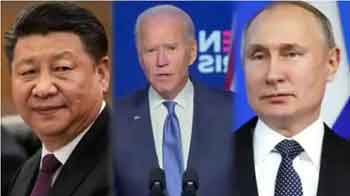INVC NEWS
Washington : Explore President Biden’s ambitious agenda at the G20 summit, where he aims to reshape multilateral development banks and address global challenges. Get insights into his priorities and vision.
President Biden’s Vision: Reshaping Multilateral Development for a Better World
In a world where global challenges are becoming increasingly complex, it is imperative that international institutions evolve to address them effectively. President Joe Biden, during his visit to New Delhi for the G20 leaders’ meeting, has underscored his commitment to radically reshaping and scaling up multilateral development banks. This move represents a pivotal moment in the realm of international finance and diplomacy.
The White House’s Vision
The White House has made it abundantly clear that President Biden’s agenda for the G20 summit is comprehensive and forward-looking. Beyond discussions on traditional geopolitical matters, the President’s priorities include debt relief for countries, climate action, health initiatives, and digital technology. These priorities reflect a broader vision for a world that is more equitable, sustainable, and technologically advanced.
A Digital Transformation and Responsible AI Development
One of the standout elements of Biden’s G20 agenda is his commitment to digital transformation and responsible artificial intelligence (AI) development. In a rapidly digitizing world, these issues are at the forefront of economic and social progress. The President aims to secure commitments that promote inclusivity in digital transformation and set forth responsible approaches to AI development. This forward-thinking approach aligns with the United States’ aspiration to lead in the digital age.
A Brief COVID-19 Scare
Before delving into the President’s ambitious plans, it’s worth noting that his visit to India was briefly cast into uncertainty when First Lady Jill Biden tested positive for COVID-19. Fortunately, President Biden’s COVID-19 test came back negative, but in line with the Centers for Disease Control and Prevention (CDC) guidelines, he will be taking precautions such as wearing a mask in public spaces and around others.
The Itinerary
National Security Adviser Jake Sullivan has announced that President Biden is scheduled to depart for New Delhi on Thursday. During his visit, he will engage in a bilateral meeting with Prime Minister Narendra Modi on Friday, followed by active participation in the G20 meeting over the weekend. This visit holds particular significance as it marks Biden’s first official visit to India since assuming the presidency. His last visit to the country dates back to 2013 when he was serving as Vice President.
Reshaping Multilateral Development Banks
At the heart of President Biden’s agenda is the ambitious endeavor to fundamentally reshape and enhance multilateral development banks, with a particular focus on the World Bank and the International Monetary Fund (IMF). These institutions play a pivotal role in catalyzing transparent and high-quality investments in developing countries.
National Security Adviser Jake Sullivan articulated the significance of this effort, stating, “We know that these institutions are some of the most effective tools we have for mobilizing transparent, high-quality investments in developing countries.” This recognition underscores the importance of strengthening these institutions to meet the challenges of today and tomorrow.
The Role of the United States
The United States has demonstrated its commitment to this cause by requesting a $25 billion increase in funding for the World Bank from the U.S. Congress. This move not only signals the U.S.’s intent to lead by example but also sets the bar high for other partner countries. The expectation is that the G20, comprising the world’s major economies, will rally behind this level of ambition.
Sullivan remarked, “We hope the G20 will support this level of ambition and provide a comprehensive vision of multilateral development banks that will be better, bigger, and more effective.” This collective effort is indicative of a renewed commitment to international development and prosperity.
Addressing the Russia-Ukraine Conflict
In addition to multilateral development bank reform, the G20 agenda will also encompass discussions regarding Russia’s invasion of Ukraine. This ongoing conflict has been a source of global concern, and the G20 remains committed to finding a resolution.
President Biden will once again call for a just and durable peace, built upon the pillars of international law, the principles enshrined in the United Nations Charter, and respect for territorial integrity and sovereignty. The United States will stand with Ukraine in its pursuit of these principles, demonstrating unwavering support in the face of adversity.
The Global Consequences
It is essential to acknowledge that Russia’s illegal war in Ukraine has far-reaching social and economic consequences. The brunt of these consequences is often borne by the world’s poorest countries. As we look to the future, it is imperative that international cooperation, as exemplified by the G20, plays a pivotal role in addressing such crises and fostering global stability.
In conclusion, President Biden’s visit to New Delhi and his participation in the G20 summit signify a commitment to reshaping the international financial landscape for the better. Through strengthening multilateral development banks, addressing pressing global issues, and championing responsible digital transformation, the United States is positioning itself as a leader in the global arena. This vision for a more equitable, sustainable, and technologically advanced world sets the stage for meaningful change on a global scale.













